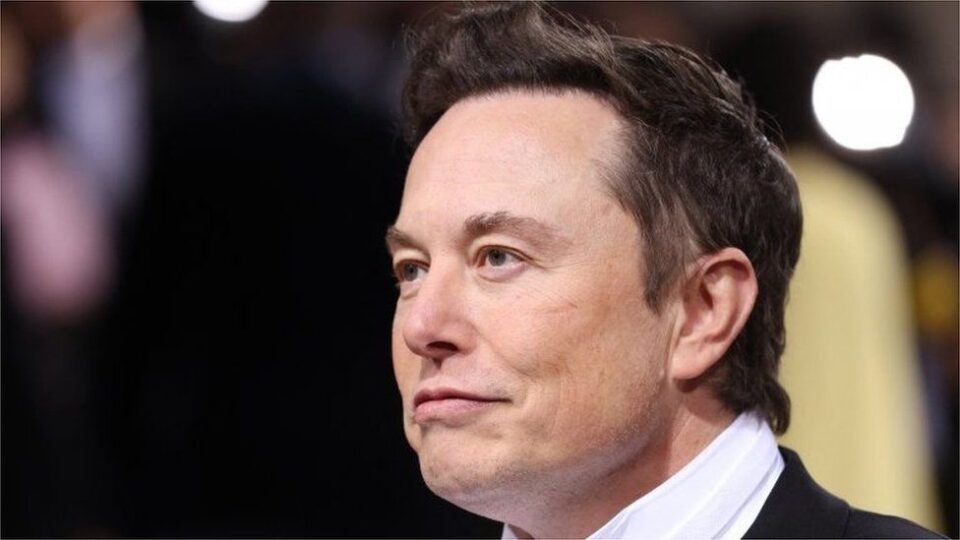Elon Musk has said his $44bn (£35bn) deal to buy Twitter is on hold after he queried the number of fake or spam accounts on the social media platform.
He said he was waiting for information “supporting [the] calculation that spam/fake accounts do indeed represent less than 5% of users”.
Mr Musk has been vocal on cleaning up spam accounts.
However, analysts speculated he could be seeking to renegotiate the price or even walk away from the takeover.
Following Mr Musk’s tweet, Twitter shares fell as much as 25% in pre-market trading.
He later tweeted that he is “still committed to acquisition”.
Under the terms of the deal, if either Twitter or Mr Musk walk away they must pay the other side a termination fee of $1bn.
Twitter reported more than two weeks ago that fake accounts accounted for fewer than 5% of its daily active users during the first three months of this year.
However, the company said in determining the amount of spam accounts, “it applied significant judgment, so our estimation of false or spam accounts may not accurately represent the actual number of such accounts”.
“The actual number of false or spam accounts could be higher than we have estimated. We are continually seeking to improve our ability to estimate the total number of spam accounts,” it said.
Mr Musk, who is the richest person in the world according to Forbes magazine, is now examining that figure.
Twitter has long had an issue with automated, fake accounts being used to relentlessly post content.
Mr Musk has called for “defeating the spam bots” on Twitter as well as several other changes, including bringing back some banned accounts such as that of former US President Donald Trump.
Dan Ives, a tech analyst at investment firm Wedbush Securities, said Mr Musk’s tweet would “send this Twitter circus show into a Friday the 13th horror show”.
He said Wall Street would now “view this deal as 1) likely falling apart, 2) Musk negotiating for a lower deal price, or 3) Musk simply walking away from the deal with a $1bn break-up fee”.
Mr Ives said if Mr Musk did still decide to go ahead with the deal, a “clear renegotiation is likely on the table”.
He added many would view him highlighting the number of spam accounts “as a way to get out of this deal in a vastly changing market”.
“The nature of Musk creating so much uncertainty in a tweet (and not a filing) is very troubling to us… and now sends this whole deal into a circus show with many questions and no concrete answers as to the path of this deal going forward.”


Another twist in the tale of Elon Musk’s attempt to own Twitter.
One of his priorities, he said, was to “clean up” the platform – weeding out the bots and spam accounts that he believes drag it down.
Spend any time on it and you’ll certainly see evidence of both.
However, Twitter says that less than 5% of its active users are fake.
So does that mean there is no diamond in the rough to be polished here, that what you see on Twitter is what you get after all? And if so, does that make it less valuable a proposition?
It is of course also possible that his new hesitation stems from how he intends to finance the deal – he’s already had to sell some of his valuable Tesla stock to raise funds, and that’s had an impact on the car firm too.
Mr Musk has some thinking to do.

Mr Musk is also chief executive of Tesla and he has used large chunks of his shares in the electric car maker to help finance the Twitter takeover.
He has sold $8.5bn worth of shares in Tesla and had planned to borrow $12.5bn secured against his shares, though this was reduced to a $6.5bn loan.
Tesla’s share price has fallen sharply since Mr Musk revealed he wanted to buy Twitter on concerns he would have to sell more stock.
But after Mr Musk tweeted that the deal was temporarily on hold, Tesla’s share price jumped by 6.7% in pre-market trade.
Mr Musk’s latest move comes after an announcement that two Twitter executives are leaving the social media company.
Kayvon Beykpour, who led Twitter’s consumer division, and Bruce Falck, who oversaw revenue, both tweeted on Thursday that the departures were not their decisions.
From this week, the firm also said it had paused most hiring, except for “business critical roles”.





